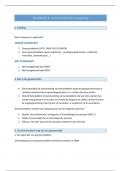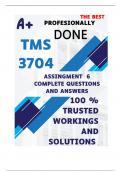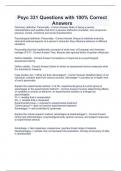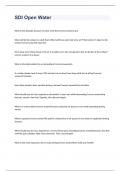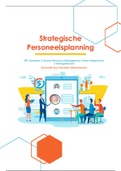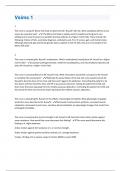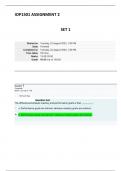Lecture 1 – Introduction
Image: Greek god celebrity/model/actor on rollercoaster
- First ride on rollercoaster
- Fabio killed a goose with his face
- This happened 20 years ago, without social media
- Nowadays: would probably make memes, he would become a laughing stock, it would go
viral
Opportunities of social media
- Stay in touch with other
- Persuade people (as a marketeer)
- Entertaining when you’re bored
- Out of curiosity
- Stalking people
- To learn something
- Visibility
- Persistent
Risks of social media
- Influencers only showing perfect (unrealistic) life
- Pressure/feeling the need to be online 24/7
- Conspiracy theories/negativity
- People persuading you to think the same thing
- Mansplaining
Key terms
- Social media = websites and applications that enable users to create and share content and/or
participate in social networking
- Risk = situation involving exposure to danger
- Opportunity = something that can benefit you, help you
Practicalities
- Exam (80%)
- Open and MC
- Written closed book
- Group assignment (20%) + pass/fail pitch
- Expert opinion letter to Ministry of Education, Culture and Science
- And a video pitch of maximum 3 minutes → make it convincing
- Maximum 4 students, 3 is okay
- 10 claims based on lecture topics
1
, - Arguments based on scientific literature
- 2,5 pages
→ Have to pass both with a 6
- Lectures not compulsory but work groups are
Lecture 2 – Experiencing online aggression (victims & perpetrators)
Introduction to online aggression
= Intentional harm delivered by the use of electronic means to a person or a group of people
irrespective of their age, who perceive(s) such acts as offensive, derogatory, harmful or
unwanted
- Bullying = an aggressive, intentional act or behaviour that is carried out by a group or an
individual repeatedly and overtime against a victim who cannot easily defend him- or herself
- Happens repeatedly
- Power balance
- Cyber-aggression encompasses both cyber harassment and cyberbullying, along with other
forms of online aggression
Examples
- Tyler Clementi (18, in the US) committed suicide because his roommate had turned on
webcam when Tyler was making out with his boyfriend and the roommate shared it on the
internet
- Picture of Dutch royal family and princess Amalia got a lot of comments on her weight
- Belgian influencer’s picture on Instagram got a lot of comments on being too thin
- Elementary class picture with a girl in black and white and rude comments on her
Article 1 - Dark Triad personality traits and adolescent cyber-aggression
- Not one explanation why people behave like this
- Dark Triad = negative personality characteristics (socially offensive traits)
1. Narcissism: extreme self-involvement, you feel important and unique, fantasise
about success, want a lot of attention and special favours, exploit others, ignoring
others, focus on own success
= A sense of importance and uniqueness, fantasies of unlimited success,
requiring constant attention, expecting special favours and being
interpersonally exploitative
- Associated with offline aggressions among adolescents
- Function well in online environments (due to controllability of online
self-presentation + shallowness of online relations)
- Narcissistic exploitativeness (exploitative of others, only your own interest in
mind, no moral compassion), a sub-construct of narcissism, is associated with
cyber-aggression among adolescents
2. Machiavellianism: manipulating other people, use their power to gain power
= Manipulative strategies of social conduct that are not correlated with general
intelligence, and that do not necessarily lead to success
2
, - Associated with offline aggressions among adolescents
- Ze gaan over lijken/do whatever means necessary to obtain their goal (being
popular for example)
3. Psychopathy: impulsive, arrogant and deceitful, cold, insensitive (not a lot of
empathy, don’t take feelings of others in account)
= An impulsive behaviour style, an arrogant, deceitful interpersonal style and
deficient affective experience
- Associated with offline aggression among adolescents + cyber-aggression
among adolescents
- Think about themselves, not scared to deceit others in order to get what they
want
- Traits are clustered, however, correlations among the traits are fairly modest
- Different but do correlate
- High on psychopathy probably also high on Machiavellianism
- Each component may still be viewed as distinct aspect of socially aversive behaviour
Present study
- First study to do it with online aggression
- Study association between Dark Triad traits (as a combined Dark Triad cluster) and
cyber-aggression among an adolescent population
- Cyber-aggression?
- Aggressive, intentional act
- Using electronic means
- To a person or a group irrespective of their age, who perceive(s) such acts as
offensive, derogatory, harmful or unwanted
Method
- 324 adolescents aged 14 to 18
- On Facebook
- Convenience sample in schools, scouting organizations and sports clubs
- Online survey
- Ethical approval because of age: privacy, information sheet where to find help, inform
teacher, need parental consent (every parent has to sign a paper that they agree on
participation)
- Instruments
- The Short Dark Triad scale
- Not subconcepts of the traits
- Facebook cyber-aggression scale (e.g., “sending insulting Facebook
messages/comments to someone (repeatedly)”)
- Indicate number of times they engaged in specific activities in the past three
months
- Facebook Intensity Scale
- Those who are more active on social media, have higher probability to be
involved in online aggression
- Narcissism related to being active on social media
Results
- 35,8% engaged at least once in the past three months in one or more than one of the eight
cyber-aggression activities
3
, - Most used activity was “saying things about someone to make the person a laughing stock”
- 17.6% of the respondents at least once in the past three months
- Followed by “sending insulting Facebook messages or comments to someone repeatedly”
- 15.1%
- Non-significant relationships between narcissism + Machiavellianism and cyber-aggression
- Psychopathy and cyber-aggression positive relationship → more psychopathy leads to more
cyber-aggression
- Facebook intensity and cyber-aggression positive relationship → more intense leads to
higher frequency cyber-aggression
- Some correlations: does this Facebook intensity mediates Dark Triad and cyber-aggression?
- No, only direct relationship
- Intensive Facebook users were associated with higher scores on Machiavellianism and
psychopathy, but not with higher scores on narcissism
- Boys scored higher on Machiavellianism, psychopathy, and cyber-aggression, whereas girls
tended to be more intensive Facebook users
- Finally, younger adolescents scored significantly higher on psychopathy in comparison to
older adolescents
Implications
- As personality traits are fairly stabilized in this age group, cyber-aggression may be used as
an indicator of Dark Triad personality traits in adolescent individuals
- Prevention?
- Social perspective-taking skills have been proven successful in overcoming
egocentrism and antisocial behaviour
- Not done well with psychopathy
- Include training of these skills in prevention programs
Limitations
- But short scale and self-report (underestimation probably), socially desirable answers
probably (use social desirability scale to solve this)
- Short Dark Triad instrument did not allow to investigate sub-constructs of
Machiavellianism, narcissism and psychopathy
- Convenience sample
- More girls than boys so cannot generalize
- Only Facebook, maybe different on other platforms
4


